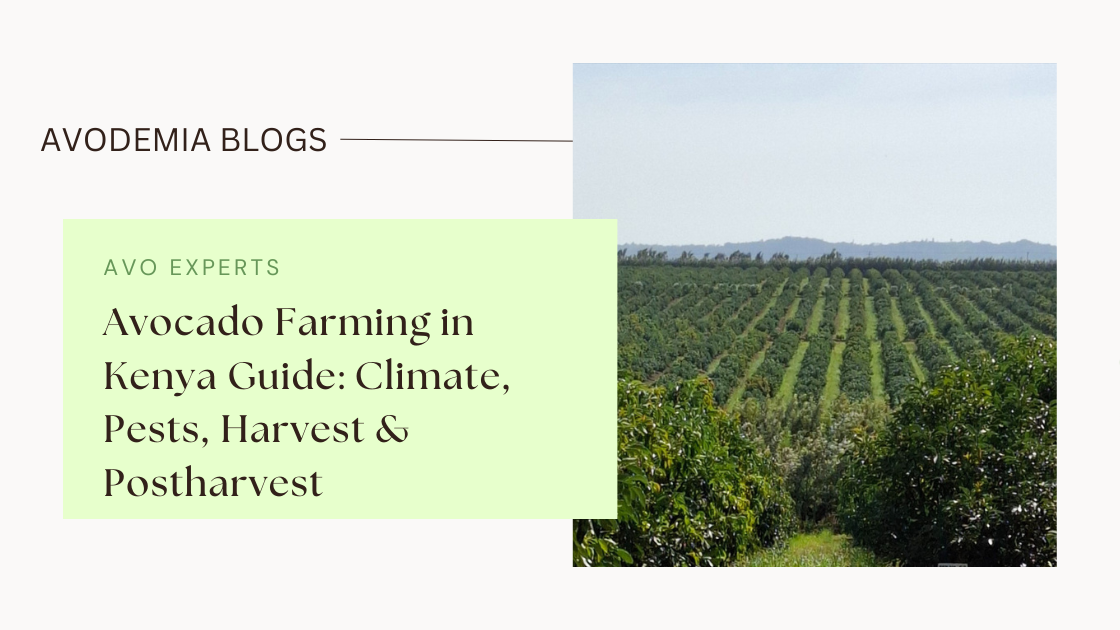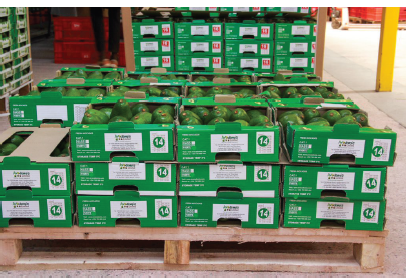
Avocado Farming in Kenya Guide: Climate, Pests, Harvest & Postharvest
Introduction
Avocado farming in Kenya has grown from a smallholder venture to one of the country’s most profitable agribusiness opportunities. With rising global demand for Kenyan Hass avocados, favorable climate conditions, and strong export potential, thousands of farmers are tapping into this green gold. At Avodemia, we work closely with farmers across the region—providing high-quality seedlings, agronomic support, and market access—to ensure every harvest meets international export standards.
🌍 Why Avocado Farming Thrives in Kenya
Kenya’s high-altitude regions provide perfect growing conditions for avocados. The moderate temperatures, well-distributed rainfall, and fertile soils make areas like Murang’a, Kiambu, Nyeri, Kisii, Meru, and Nakuru leading production zones.


Key reasons avocado farming is booming:
- ✅ High Export Demand: Europe, the Middle East, and China are major buyers of Kenyan Hass avocados.
- ✅ Favorable Climate: Temperatures of 20°C–25°C and altitudes between 1,000–2,000m above sea level are ideal.
- ✅ Early Returns: Grafted avocado trees start bearing fruits in 2–3 years.
- ✅ Strong Profit Margins: A mature Hass avocado tree can yield 200–300 fruits annually.
🥇 Choosing the Right Variety
The Hass avocado is the dominant export variety due to its creamy texture, high oil content, and long shelf life. Its skin turns dark purple when ripe, making it easy to identify for consumers and exporters.
Other varieties cultivated locally include:
- Fuerte – Smooth green skin, early-maturing, popular in local markets.
- Pinkerton – Elongated shape, high yield, moderate oil content.
- Jumbo/Kienyeji – Large fruit size, suitable for local consumption.
For export purposes, Hass is the best choice, as it aligns with European and Asian market preferences.
📸 Suggested image: Close-up photo of Hass avocados on a tree, showing color and texture.
🌦️ Climate & Soil Requirements
- Altitude: 1,000–2,000 meters above sea level.
- Temperature: 20°C–25°C optimal; avoid frost-prone areas.
- Rainfall: 1,000–1,500 mm annually, well-distributed.
- Soil Type: Deep, fertile, well-drained loamy soils. Avoid clay and waterlogged areas.
- Soil pH: Between 5.5 and 6.5.
To boost soil health, farmers are encouraged to use organic compost and maintain mulch around young trees to retain moisture and suppress weeds.
🌱 Land Preparation & Planting
- Clear the Land: Remove weeds, stumps, and unwanted vegetation.
- Dig Planting Holes: 60 cm × 60 cm × 60 cm. Mix topsoil with compost or manure.
- Spacing:
- For Hass avocados: 5m × 5m (approx. 150 trees per acre).
- For large-scale farms: 6m × 6m or 8m × 8m.
- Timing: Plant at the onset of the rainy season for natural moisture support.
- Staking: Provide support for young seedlings to prevent wind damage.
🌿 Orchard Management & Irrigation
Proper orchard management determines the long-term success of your avocado farm.
- Irrigation: Young trees need frequent watering. Drip irrigation is recommended for efficiency.
- Pruning: Shape trees for better light penetration and ease of harvesting.
- Weeding: Keep the base clean to reduce pest habitats.
- Fertilization: Use organic compost and supplement with NPK and trace minerals (Boron, Zinc, Calcium).
- Mulching: Retains moisture and adds nutrients to the soil.
🐛 Pests & Diseases Management
Common avocado pests and diseases in Kenya include:
- Fruit Flies – Cause premature fruit drop.
- Root Rot (Phytophthora spp.) – Leads to leaf yellowing and wilting; avoid overwatering and ensure good drainage.
- Anthracnose – Causes black spots on fruits; prune and apply copper-based sprays if needed.
- Thrips and Mites – Damage young leaves and reduce yields.
✅ Integrated Pest Management (IPM) is recommended:
- Regular scouting and early detection.
- Use of clean, certified planting materials.
- Maintain good air circulation and field hygiene.
- Organic or biological control options where possible.
🥑 Harvesting & Post-Harvest Handling
Avocados are harvested when mature but not yet ripe.
Key indicators of maturity:
- The fruit’s skin changes from bright green to duller green or purplish.
- The seed coat turns brown.
- The fruit detaches easily from the stem when twisted.
Post-harvest best practices:
- Handle fruits gently to avoid bruising.
- Sort and grade by size and quality.
- Use ventilated crates for transport.
- Maintain a cold chain if exporting (8°C–10°C ideal).

🌍 Market & Export Opportunities
Kenya exports fresh Hass avocados to major destinations including:
- Europe (Netherlands, UK, France, Spain)
- Middle East (UAE, Saudi Arabia, Qatar)
- Asia (China, India, Malaysia)
Exporters like Avodemia Ltd ensure compliance with GlobalGAP, HACCP, and phytosanitary standards for every shipment.
As the avocado value chain matures, opportunities are also expanding in:
- Cold-pressed avocado oil production.
- Processed avocado pulp for export.
- Local value addition for cosmetic and wellness industries.
📸 Suggested image: Crates of Hass avocados ready for export.
💰 Profitability & Yield Potential
A well-managed acre of Hass avocados can produce:
- 8,000–10,000 kg annually (mature orchard).
- At an average farm-gate price of KES 80–100 per kg, income can exceed KES 800,000–1 million per acre per year.
However, profitability depends on:
- Quality seedlings.
- Proper pruning and pest control.
- Market access and consistent buyers.
📸 Suggested image: Smiling Kenyan farmer with baskets of harvested avocados.
🌱 Sustainability & Farmer Empowerment
At Avodemia, sustainability is at the heart of our operations. We train farmers on:
- Organic farming and soil regeneration.
- Water-efficient irrigation practices.
- Traceability and export compliance.
- Value addition through oil extraction and packaging.
Our goal is to empower smallholder farmers to earn more while protecting the environment and producing premium, globally trusted Kenyan avocados.
🏁 Conclusion
Avocado farming is transforming lives across Kenya. With the right guidance, quality seedlings, and good agricultural practices, every farmer can benefit from this green revolution.
Partner with Avodemia expert support, and guaranteed market access for your harvest.




Leave a Comment